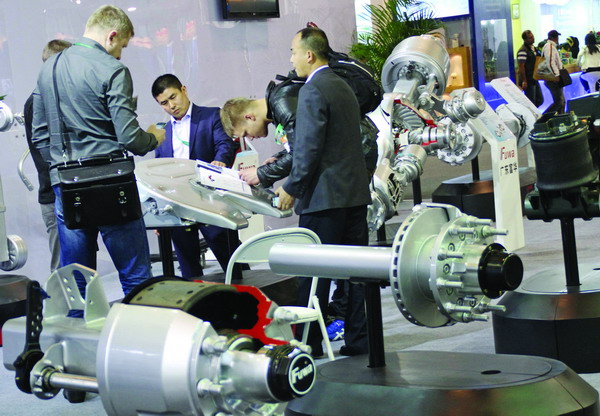With the outlook for the global economy giving little cause for celebration, the manufacturing powerhouse is falling victim to rising trade protectionism, report Ding Qingfen and Li Jiabao.
It's a familiar turn of events: When the global economy worsens, trade disputes become more common, especially those targeting goods that are "made in China".
|
 An auto parts exhibition in Beijing in April. On Monday, US President Barack Obama announced the United States would go to the World Trade Organization to file a lawsuit alleging that China provides subsidies to companies that make automobiles and auto parts, thus harming their US competitors. [Photo/China Daily] |
On Monday, US President Barack Obama announced the United States would go to the World Trade Organization to file a lawsuit alleging that China provides subsidies to companies that make automobiles and auto parts, thus harming their US competitors.
In response, the Ministry of Commerce said on Wednesday: "The US' decision was made out of political considerations. A presidential election is now going on in the US and President Obama made the announcement in Ohio, which is a state where much automobile production takes place. China is firmly opposed to the US action."
While uncertainties about Europe's debt troubles linger and the US economic troubles wield a strong influence over the current presidential campaign, a new wave of trade protectionism is being directed against China.
China has repeatedly called on the US to abide by its commitment to fight trade protectionism and to ensure that international trade is conducted in an open and fair manner.
"From cases involving solar panels to rare earths and many other sorts of products, we have already seen that trade protectionism is being used more often against China, and this will probably continue for a couple more months," said Zhang Xiangchen, director-general of the Ministry of Commerce's department of policy research.
He said "the US and the (European Union) will be the most aggressive players in the game", noting that their economies are plagued by either "high unemployment" or "huge debt burdens".
In early September, the EU announced plans to start an anti-dumping investigation into exports of Chinese solar panels, which, last year, had a value of 21 billion euros ($27.5 billion). The probe came at the request of a group of 25 producers of solar equipment and is the biggest-ever anti-dumping claim to be submitted to the bloc. The EU countries are the chief destinations of Chinese exports, making it likely that the investigation will deal a devastating blow to Chinese solar companies if it results in the imposition of greater duties.
For more than a decade, China has been a target of trade disputes, a development that has largely resulted from the quickening pace of its exports. Since 2009, a wave of trade investigations into Chinese exports, led especially by the US, has threatened to drown Chinese manufacturers.
The conditions are even worse this time. "Europe's debt troubles are spreading to more countries" at the same time that the "US presidential election campaign is drawing to a close and the world's largest economy is struggling to recover", said Tu Xinquan, deputy director of the China Institute for WTO Studies at the University of International Business and Economics in Beijing.
The first half of this year saw the start of 40 trade remedy investigations into Chinese exports, a number up by 38 percent year-on-year.
In one of the most significant of those cases, the US, the EU and Japan submitted a complaint about China to the World Trade Organization in March, accusing it of controlling exports of rare earths, elements that are widely used in the production of smartphones, computers and other sophisticated hardware.
Previously this year, Obama had announced plans to establish an enforcement unit that would work across agencies to crack down on unfair trade practices conducted by US trade partners. Many saw that decision as being the president's attempt, as he tries to get re-elected, to show voters that he is getting tough on China.
As the presidential election enters its final months, and both major party candidates work ever harder to win votes, China is only likely to become the target of more blame.
A recent survey suggested that 62 percent of US citizens are in favor of getting tough on China, want to "use every possible means to stop (its) unfair trade practices" and are concerned that too many jobs are being "shipped" overseas.
